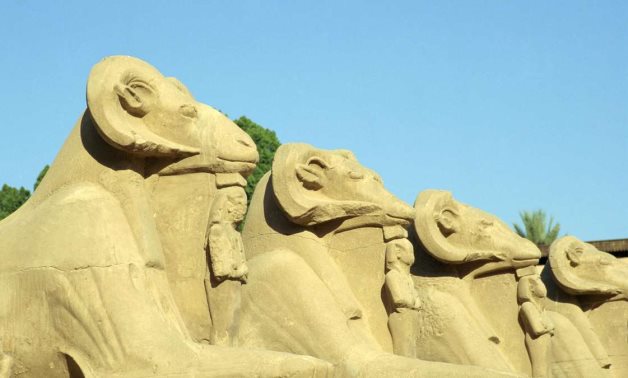All you need to know about restoration works of 29 ram statues in Karnak Temples

Some of the Ram statues located in the Karnak Temples in Luxor - The National
CAIRO – 15 September 2020: Egypt's Minister of Tourism and Antiquities Khaled el-Anani, accompanied by Mostafa Waziri, secretary general of the Supreme Council of Antiquities, inspected work on raising the efficiency and restoration of 29 rams, located in the first courtyard of the Karnak Temples.
Where are these rams located in the Karnak Temple Complex?
The statues consist of 29 statues of rams, located inside the temple behind the first pylon. It was in a poor state of preservation due to the faulty restoration work done on it in the early seventies when constructing the sound and light project at the Karnak Temple Complex.
How was the restoration of the rams carried out?
These rams were restored and raised on a layer of modern rubble covered with cement mortar, red bricks and small pieces of stones, which negatively affected them. Underground water was allowed to seep in between its lower part, and to reach the base of the ram, which led to the transformation of some parts of it into sand powder.
The restoration project places these statues respectively on pillars on top of adjacent stone bases. Also, the floor of these bases will be treated, protected from groundwater, and returned to its original place.
What is the description of the restored rams?
The weight of each ram is about 5 tons and a half and it represents the god Amun-Ra and his symbol, the ram in ancient Egypt. It was the symbol of strength and fertility for the ancient Egyptians.
The idea of the restoration depends on two axes, the first of which is to move the rams from their place and dig a trench approximately 2 meters wide and 1.5 meters deep, then filling the trench floor with modern gravel and sand.
Are studies conducted on the restored rams?
The second axis of the restoration is the study of the inscriptions, writings and scenes on the bases of these rams. It is the first time in the history of archaeological studies and research that these rare inscriptions are highlighted and studied. This mega project is scheduled to be completed around mid-2021.
-- Sent from my Linux system.
No comments:
Post a Comment